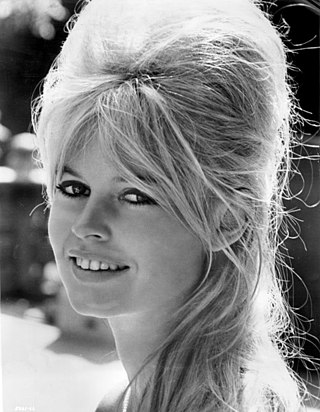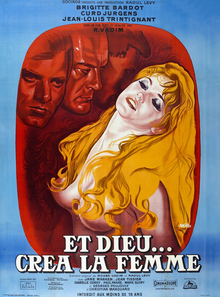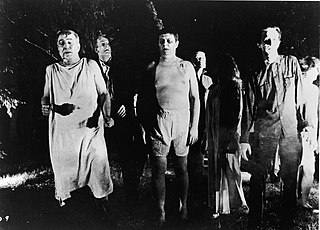Related Research Articles

Brigitte Anne-Marie Bardot, often referred to by her initials B.B., is a French animal rights activist and former actress, singer, and model. Famous for portraying sexually emancipated characters, often with hedonistic lifestyles, she was one of the best known activists in the sexual revolution of the 1950s–1970s. Although she withdrew from the entertainment industry in 1973, she remains a major popular culture icon and a noted figure in ushering in the sexual revolution. She has acted in 47 films, performed in several musicals, and recorded more than 60 songs. She was awarded the Legion of Honour in 1985.

The Motion Picture Patents Company, founded in December 1908 and effectively terminated in 1915 after it lost a federal antitrust suit, was a trust of all the major US film companies and local foreign-branches, the leading film distributor and the biggest supplier of raw film stock, Eastman Kodak. The MPPC ended the domination of foreign films on US screens, standardized the manner in which films were distributed and exhibited within the US, and improved the quality of US motion pictures by internal competition. It also discouraged its members' entry into feature film production, and the use of outside financing, both to its members' eventual detriment.

Roger William Corman was an American film director, producer and actor. Known under various monikers such as "The Pope of Pop Cinema", "The Spiritual Godfather of the New Hollywood", and "The King of Cult", he was known as a trailblazer in the world of independent film.

The Motion Picture Production Code was a set of industry guidelines for the self-censorship of content that was applied to most motion pictures released by major studios in the United States from 1934 to 1968. It is also popularly known as the Hays Code, after Will H. Hays, president of the Motion Picture Producers and Distributors of America (MPPDA) from 1922 to 1945. Under Hays's leadership, the MPPDA, later the Motion Picture Association of America (MPAA) and the Motion Picture Association (MPA), adopted the Production Code in 1930 and began rigidly enforcing it in 1934. The Production Code spelled out acceptable and unacceptable content for motion pictures produced for a public audience in the United States.

Lady Chatterley's Lover is the last novel by English author D. H. Lawrence, which was first published privately in 1928, in Italy, and in 1929, in France. An unexpurgated edition was not published openly in the United Kingdom until 1960, when it was the subject of a watershed obscenity trial against the publisher Penguin Books, which won the case and quickly sold three million copies. The book was also banned for obscenity in the United States, Canada, Australia, India and Japan. The book soon became notorious for its story of the physical relationship between a working-class man and an upper-class woman, its explicit descriptions of sex and its use of then-unprintable profane words. It entered the public domain in the United States in 2024.
American International Pictures LLC is an American film production company owned by Amazon MGM Studios. In its original operating period, AIP was an independent film production and distribution company known for producing and releasing films from 1955 until 1980, a year after its acquisition by Filmways in 1979.

And God Created Woman is a 1956 French romantic drama film directed by Roger Vadim in his directorial debut and starring Brigitte Bardot. Though not her first film, it is widely recognized as the vehicle that launched Bardot into the public spotlight and immediately created her "sex kitten" persona, making her an overnight sensation.

RKO General Inc. was an American broadcasting company that, from 1952 through 1991, served as the main holding company for the noncore businesses of the General Tire and Rubber Company and later on GenCorp. The concern was based around the consolidation of its parent company's broadcasting interests, which dated to 1943 and were brought together under the General Teleradio umbrella in 1952. The company was renamed RKO Teleradio Pictures following its 1955 purchase of the RKO Pictures film studio, and then RKO General in 1959 after dissolving the motion picture division. Headquartered in New York City, the company operated six television stations and more than a dozen major radio stations around North America between 1959 and 1991.
Grove Press is an American publishing imprint that was founded in 1947. Imprints include: Black Cat, Evergreen, Venus Library, and Zebra. Barney Rosset purchased the company in 1951 and turned it into an alternative book press in the United States. He partnered with Richard Seaver to bring French literature to the United States. The Atlantic Monthly Press, under the aegis of its publisher, Morgan Entrekin, merged with Grove Press in 1993. Grove later became an imprint of the publisher Grove/Atlantic, Inc.

Screen Gems is an American brand name owned by Sony Pictures Entertainment, a subsidiary of Japanese multinational conglomerate, Sony Group Corporation. It has served several different purposes for its parent companies over the decades since its incorporation, initially as a cartoon studio, then a television studio, and later on as a film studio. The label currently serves as a film production that specializes in genre films, mainly horror.

Anglo-Amalgamated Productions was a British film production company, run by Nat Cohen and Stuart Levy, which operated from 1945 until roughly 1971. Low-budget and second features, often produced at Merton Park Studios, formed much of its output. It was the UK distributor of many films produced by American International Pictures (AIP), who distributed AA's films in the United States.

The 1950s mark a significant change in the definition of the B movie. The transformation of the film industry due to court rulings that brought an end to many long-standing distribution practices as well as the challenge of television led to major changes in U.S. cinema at the exhibition level. These shifts signaled the eventual demise of the double feature that had defined much of the American moviegoing experience during Hollywood's Golden Age of the 1930s and 1940s. Even as the traditional bottom-of-the-bill second feature slowly disappeared, the term B movie was applied more broadly to the sort of inexpensive genre films that came out during the era, such as those produced to meet the demands of the burgeoning drive-in theater market.

Lady Chatterley's Lover is a 1955 French drama film directed by Marc Allégret who co-wrote screenplay with Philippe de Rothschild and Gaston Bonheur, based on the 1928 novel by D. H. Lawrence. In 1955, the film was banned in New York because it "promoted adultery", but it was released in 1959 after the U.S. Supreme Court reversed a lower court's decision.
Myriad Pictures is an independent entertainment company in Santa Monica, California founded in 1999 and specializing in production, financing and worldwide distribution of feature films and television programming.

Film censorship in the United States was a frequent feature of the industry almost from the beginning of the U.S. motion picture industry until the end of strong self-regulation in 1966. Court rulings in the 1950s and 1960s severely constrained government censorship, though statewide regulation lasted until at least the 1980s.

Bryna Productions is an American independent film and television production company established by actor Kirk Douglas in 1949. The company also produced a handful of films through its subsidiaries, Michael Productions, Joel Productions and Douglas and Lewis Productions, and outside the United States through Brynaprod. Other subsidiaries included Eric Productions, which produced stage plays, Peter Vincent Music, a music publishing company, Bryna International, a photographic service company, and Public Relations Consultants, which supervised the publicity of its early films. Douglas named the main company after his mother, Bryna Demsky, while its primary subsidiaries were named after his sons: Michael Douglas, Joel Douglas, Peter Douglas and Eric Douglas. In 1970, Bryna Productions was renamed The Bryna Company, when Douglas welcomed his children and second wife into the firm. Nevertheless, Michael, Joel and Peter, wanting to establish individual identities, went on to form their own independent film production companies.

Arthur L. Mayer was an American film producer and film distributor who worked with Joseph Burstyn in distributing films directed by Roberto Rossellini and other famous European film directors. Some films were distributed under the name Burstyn-Mayer Inc. Mayer was also interviewed by Warren Beatty for Beatty's film Reds (1981).
Ephraim S. London was an American attorney and law professor specializing in constitutional law who established a reputation as a defender of free speech and civil liberties. He taught constitutional law at the New York University School of Law, his alma mater. He wrote The World of Law, a textbook that was widely used in law schools. He was also the author of The Law as Literature.
Curtleigh Productions was an American independent film and television production company established by actor and actress husband-and-wife team Tony Curtis and Janet Leigh. The company was formed in 1955 and produced a handful of major motion pictures during its span, including Mister Cory, Sweet Smell of Success, The Vikings, The Defiant Ones, and Taras Bulba. Although plans originally called for co-starring vehicles for the couple, Leigh took little interest in developing properties. Following the couple's divorce in 1962, Curtis continued to develop and produce properties previously acquired through Curtleigh Productions, first channeling the corporate structure through his own outfit, Curtis Enterprises, then forming a new film production company, Reynard Productions.
References
- ↑ IMDb: Kingsley-International Pictures Linked 2013-08-21
- 1 2 3 4 Tino Balio: The Foreign Film Renaissance on American Screens, 1946–1973 (Univ of Wisconsin Press 2010, page 84) Linked 2013-08-21
- ↑ Press release from the Museum of Modern Art, July 1971: Museum Honors Arthur Mayer in his 85th Year Linked 2013-08-21
- ↑ US Supreme Court ruling, June 29, 1959, in the case "Kingsley International Pictures Corp. v. Regents of the University of the State of New York" Archived May 11, 2012, at the Wayback Machine Linked 2013-08-21
- ↑ Encyclopedia of American Civil Liberties: Kingsley International Pictures Corporation v.Regents of the University of New York, 360 U.S.684(1959) Archived 2016-03-04 at the Wayback Machine Linked 2013-08-21
- ↑ Steve Neale: Classical Hollywood Reader (Routledge, 2012) Linked 2013-08-21